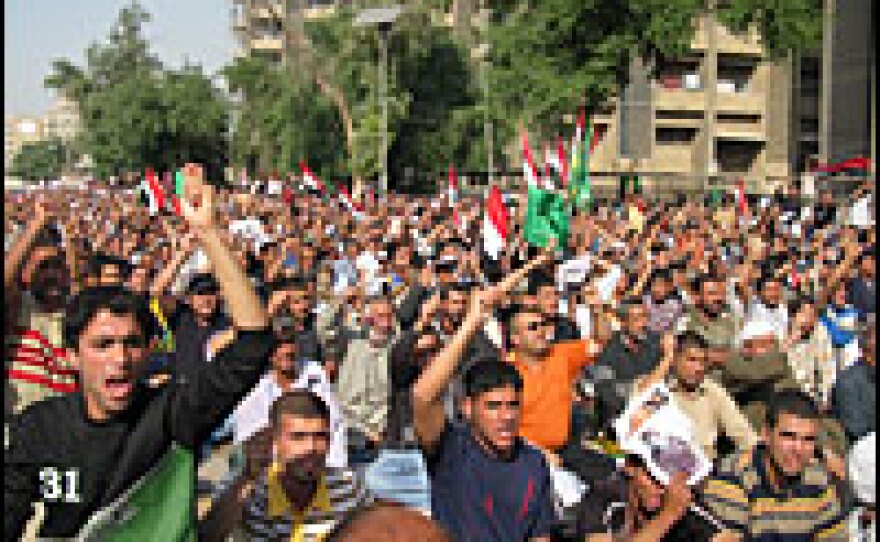
Tens of thousands of Iraqis crowded in Baghdad's Firdos Square on Friday, joining for protest, prayer and a series of speeches by Shiite clerics, including one read in the name of Muqtada al-Sadr. Sadr is a fiercely anti-American cleric who has battled many times in the face of U.S. forces.
Ivan Watson tells NPR's Steve Inskeep that the scene in the square is relatively peaceful, compared with past violent activity in the area.
The demonstrators are denouncing the proposed security pact — the status of forces agreement — that calls for U.S. forces to pull back from Iraqi towns and cities by the end of June 2009, and for a complete withdrawal from Iraq by the end of 2011. Sadr and his supporters want the U.S. out of Iraq now.
"In addition to that, [the pact] stipulates that American forces cannot carry out operations, cannot raid houses or arrest Iraqis without first getting permission from the Iraqi government," Watson says. "So it does mark a pretty dramatic change for the status of the U.S. military presence in Iraq — that is if it is approved by the parliament."
During and after the U.S. withdrawals, Iraq's government and security forces will be in charge. Those forces are much more visible and are taking a stronger position in military and security operations, Watson says. But some Iraqis, including one army officer in charge of security at Friday's protest in Baghdad, say it's too early for U.S. forces to move out. The officer said Iraqi forces still need help on the ground.
Iraq's parliament is currently debating the pact and could vote as early as Monday. Discussion has been fierce in parliament; a fracas broke out Wednesday on the floor of the parliament hall, led by lawmakers loyal to Sadr.
"A number of Iraqi political parties have voiced opposition to the proposed draft agreement — they have said they will not vote in favor of it if a vote takes place next week," Watson says, "but it is the Sadrist lawmakers who have been most active in showing their opposition — pounding the desks and actually rushing up to the podium."
A big question remains about how the agreement can be approved.
"There is a debate whether or not it can pass in parliament with a simple majority, or more than two-thirds," Watson says. "Pro-government officials will argue that you really need more than two-thirds for some kind of consensus and hope of a peaceful future in Iraq."
Copyright 2022 NPR. To see more, visit https://www.npr.org. 9(MDAzMjM2NDYzMDEyMzc1Njk5NjAxNzY3OQ001))








